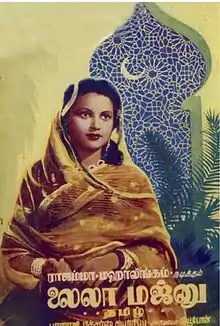Laila Majnu (1950 film)
Laila Majnu is a 1950 Indian Tamil-language film directed by F. Nagoor. The film featured T. R. Mahalingam and M. V. Rajamma in the lead roles.[2]
| Laila Majnu | |
|---|---|
 | |
| Directed by | F. Nagoor |
| Screenplay by | Vallikannan |
| Based on | Laila Majnu - a legendary story |
| Starring | T. R. Mahalingam M. V. Rajamma N. S. Krishnan T. A. Mathuram |
| Music by | S. V. Venkatraman |
| Cinematography | Jitten Bannerji P. S. Selvaraj |
| Edited by | V. B. Nataraja Mudaliar |
Production company | Balaji Pictures |
Release date |
|
| Country | India |
| Language | Tamil |
Plot
The story is the famous Persian tale of Layla and Majnun. It has parallels in Shakespeare's Romeo and Juliet, and in Tamil stories, Ambikapathy and Amaravathi.[2]
Cast
The list was compiled from the film's song book.[3]
|
|
Production
The film was produced and directed by F. Nagoor under the banner Balaji Pictures and was funded by M. K. Thyagaraja Bhagavathar. The famous writer Vallikkannan wrote the dialogues.[2] Cinematography was by Jitten Bannerji and the operative cameraman was P. S. Selvaraj. V. B. Nataraja Mudaliar did the editing. Art direction was also done by F. Nagoor. Choreography was by Hiralal, Ganesh and Joshi. The film was shot at Newtone studios and the stills were taken by R. N. Nagaraja Rao and Gnanam.[3]
Trivia
Laila Majnu's story was first made as a silent film in 1922 by J. J. Madan and again in 1927 by Manilal Joshi. In 1931, after the films became talkies, noted filmmaker Kanjibhai Rathod made it in Hindi. J. J. Madan remade it in Hindi in 1931 as a talkie. In 1936, it was produced by East India Pictures in Persian. In 1940, Dharmaveer Singh made the same story in Punjabi, and in 1941, Sarnad Pictures made a version in Pushtu language. In 1945 it was made in Hindi again featuring Swaran Lata as Leila and Nazir Ahmed as Majnu. It was a box office hit.
In 1949, P. Bhanumathi and her husband P. S. Ramakrishna Rao produced this story in Telugu and it was dubbed into Tamil and released simultaneously with the Telugu version in 1949. The story was again made in 1953, 1976 (in Hindi and Bengali), and later in 1982.[2]
Soundtrack
Music was composed by S. V. Venkatraman, while the lyrics were penned by Lakshmanadas and Kambadasan.[1] Singers are T. R. Mahalingam, N. S. Krishnan and T. A. Mathuram. Playback singer is T. S. Bhagavathi.
The following list of songs is compiled from the song book.[3]
| No. | Song | Singer/s | Length |
|---|---|---|---|
| 1 | "Anudhinam Sandoshamakave" | T. R. Mahalingam & T. S. Bagavathi | |
| 2 | "Thara Thalathaiye" | T. A. Mathuram | |
| 3 | "Varuvaaro Maangkuyile Sol" | T. R. Mahalingam & T. S. Bagavathi | |
| 4 | "Sanjalak Kadalile.... Yaar Poi Solluvar" | T. R. Mahalingam | 02:47 |
| 5 | "Meena Mani Izhaitha Chandirane" | ||
| 6 | "Paaril Anaathi Naanallave" | T. R. Mahalingam | |
| 7 | "Ezhil Vaanil Vilaiyaaduvome" | T. R. Mahalingam | |
| 8 | "Sohnaa Illannaa Luunaa, Sollu" | N. S. Krishnan & T. A. Mathuram | 03:14 |
| 9 | "Parandhu Selludhe En Paingkili" | T. R. Mahalingam | 02:57 |
| 10 | "Vaazhvil Anbaale" | ||
| 11 | "Paingiliye Mano Raagini" | T. R. Mahalingam & T. S. Bagavathi | 02:34 |
| 12 | "Vanna Maane Un Ninaivaale" | T. R. Mahalingam | 03:10 |
| 13 | "Neethiyaguma.... Aavi Sorudhe" | 02:59 | |
| 14 | "Kadhalin Madhiyo" | T. S. Bagavathi | 02:42 |
| 15 | "Maadharase Mayile" | T. R. Mahalingam | 02:22 |
| 16 | "Paavi Ennai Poloruvar" | T. R. Mahalingam & T. S. Bagavathi | 03:05 |
Reception
The film did not do well at the box office. However, the film is "remembered for the interesting on-screen narration and performances by Rajamma and Mahalingam."[2]
References
- Film News Anandan (23 October 2004). Sadhanaigal Padaitha Thamizh Thiraipada Varalaru [History of Landmark Tamil Films] (in Tamil). Chennai: Sivakami Publishers. Archived from the original on 24 May 2017. Retrieved 28 September 2019.
- Guy, Randor (19 February 2012). "Leila Majnu 1950". The Hindu. Archived from the original on 14 August 2014. Retrieved 28 September 2019.
- Laila Majnu song book.
External links
- Painkiliye mano ragini on YouTube - Song by T. R. Mahalingam and T. S. Bhagavathi